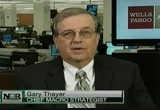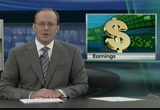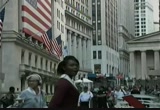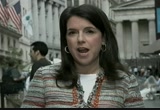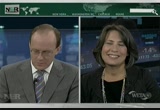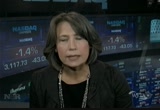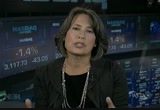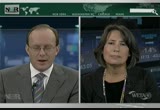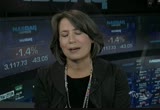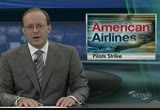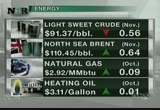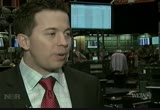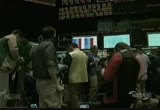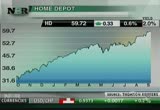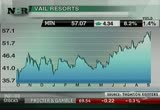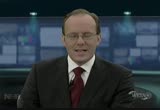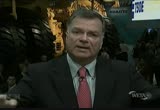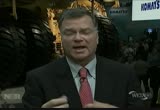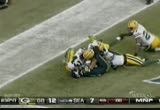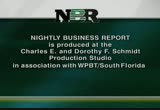tv Nightly Business Report PBS September 25, 2012 6:30pm-7:00pm EDT
6:30 pm
>> this is nbr. >> tom: good evening. i'm tom hudson. susie has the night off. housing prices continue rising and consumers become more confident-- two bright spots of the economy. was the bank bailout overdone? hear what a former top regulator says about the rescue. former fdic chairman sheila bair joins us. and if american airlines and its pilots strike a deal tomorrow, it could mean fewer delays for customers and the company's bankruptcy. that and more tonight on nbr! captioning sponsored by wpbt >> tom: some encouraging news tonight for the housing market and consumer confidence.
6:31 pm
first, housing-- a measurement of prices in 20 cities across the country rose four tenths of a peent in july. that's the sixth straight month of gains for the s&p case- shiller home price index. and consumer's are feeling more optimistic. the conference board's confidence index rose to 70.3 in september, marking its highest level since february. these two groups, consumers and housing, are significant because of their influence over the entire economy. >> with the improvement in consumer confidence, we think that consumer spending could pick up as we go into next year. especially since the housing market is showing signs of life and moem prices are jarting to firm up. but the encouraging data didn't help stock prices today. instead, comments by central bankers in the u.s. and europe weighed on today's trading. the dow lost 101, the nasdaq shed 43, the s&p is down 15. the head of the philadelphia
6:32 pm
federal reserve questioned wt he called the "meager benefits" of the fed's latest bond buying program. and a european central bank member said his agency would not help restructure greek government debt. also weighing on stocks today, high anxiety about third-quarter earnings. u.s. corporate profits have outpaced the broader economy since the end of the great recession, but profits warnings yesterday from caterpillar, and recently from intel, fedex and burberry, suggest the boom in earnings is finally beginning to fizzle. suzanne pratt takes a closer look at how the numbers are shaping up for third quarter and beyond. >> reporter: the start of reporting season for corporate america is still two weeks away, but already on wall street, the worrying about profits is heating up. and it sounds like investors have good reason to be nervous. after all, analysts predict companies in the s&p 500 will see earnings drop an average of 2% in the third quarter. if that happens, it will be the
6:33 pm
first such decline in three years. tough comparisons are partly responsible, as last year's third quarter was one of the best ever. on top of that, however, global demand remains weak. >> i think we're just seeing a lot of issues finally mounting, things that started in 2010 and 2011 that are really starting to hit companies' bottom lines. mainly, the sovereign debt crisis in europe just doesn't seem to be going away. >> reporter: curiously, though, the stock market is more than holding its own, despite the darkening cloud of corporate profits. investment pro wayne kaufman says central banks have helped underpin stocks but, he adds, investors won't ignore weakening profits forever. >> i think they will give a pass this quarter, unless they are extremely bad and the guidance is really dire. the market is only going to give a pass on earnings for so long because, at the end, you do have to have good valuations. >> reporter: the market may also
6:34 pm
be staying strong because the outlook for fourth-quarter profits is brighter. even though the number has recently slipped, analysts believe s&p 500 earnings will grow a respectable 10% in the quarter that begins next week. still, not everyone thinks it's an achievable goal. >> i really expect that number will come back a bit once more companies report for the third quarter. i really do think analysts will start to revise fourth-quarter estimates down quite a bit. >> reporter: as for corporate profits next year, analysts are pretty optimistic, predicting on average an increase of 12% for the s&p 500. will it hold? that depends on the global economy. suzanne pratt, nbr, new york. >> tom: still ahead, as the debate over mitt romney's taxes shows, not all income is taxed the same. why how much you pay in taxes depends on how you make your money. four years ago this month, the economy was in a freefall.
6:35 pm
lehman brothers had collapsed and credit markets seized up. a.i.g. was rescued by the federal reserve. the tarp program spent billions bailing out banks, and the federal deposit insurance corporation helped save citigroup. sheila bair was among those making the decisions. she was the chairman of the fdic and has written about theed financial crisis in a new book, "bull by the horns. " she join us tonight from the nasdaq. sheila, congratulations on the book. quite a read to relive those days and months four years ago. after all the billions of dollars spent and the millions of homes foreclosed on, you wrote, i wonder if we overreacted. you say the generosity of the response troubles you, why? >> the generosity of the banks. we clearly needed to do something. weeshtd have done more to get the homeowners restructured and clean up the banks balance
6:36 pm
sheet, by making them clean up the losss and clean up the balance sheets, especially sick ones like citigroup. so some areas we didn't do enough, in banks we were lavish in the aim of mony and support we gave them. >> tom: do you regret that? >> well, i do. a lot of this is retrospective. you look back on this, and most of them only had a quarter loss, and paid by the end of 2009, and i think, you know, it troubles me, the narrative of the bailouts is they made monoa cash flow basis, so it's okay. i think that just underscores the fallacy of the policies we pursueed in 2008 and 2009. we helped the banks get profitable, and the banks interest, and the country's interest is two >> tom: and you talked extensively nlt book, especially when it comes to disagreements with timothy gietener hofs the head of the
6:37 pm
new york federal reserve back then. why such a philosophical difference between how you approached the crisis, and how he approached t and still approaches it. >> i don't know. i think tim never worked on wall street. he had a mentor at treasury. >> tom: he worked at the federal reserve. >> well, the new york fed is a big bank. so i think there tends to be an absorption of that perspective. i think tim throughout the crisis and continues to do what he thinks is right. but i think he thinks the large financial institutions are the center of activity, and if you help them be profitable you help the broader economy. it hasn't turned out that way. japan tried this. and previous cycles, we didn't get our act together during the savings and loan crisis. when in "bull by the horns", they started selling assets
6:38 pm
and got banking and the country going again. >> propping up sick institutions don't win. they nurse their balance sheet, but they're not in the position, and don't have clean balance sheets and capital and don't take risks to provide new loans t. doesn't happen. that's why ripping off the band-aid and taking losss and cleaning them up and having them with clean balance sheets, going into the economy to proitd credit support is a much better process historically. >> tom: you write in the book how you expressed complaints and short comings with the bailout strategies, and the treasury department and the federal reserve. you expressed them privately in those meetings. why didn't you go public with those frustrations four years ago. you've been outspoken in your time at the f.d.i.c. >> well, i think i did on some of them. certainly on mortgage modifications, i was quite vocal. and i was quoted on the front
6:39 pm
page of the "wall street journal" a few days after the capital investments of the big banks. i was perplexed we weren't doing much to help homeowners. some of that was public. throughout my tenure, i tried to have private conversations and use private advocacy before the bully pulpit. but a little documented we push back on these measures. at the same time i was trying to be part of the team. i hit it both ways. i was a team player and people criticized me because i pushed back at the meetings. and then they say you were part of it, so you can't complain now. that's not right. i did participate, and we dialed them back. i didn't like them then, and i don't like then now. it's an important historical per spect toif have. >> tom: it's quite a read. sheila bair, and the name of the book. "bull by the horns".
6:40 pm
>> tom: talks tomorrow between american airlines and its pilots union could mean smoother travel for customers, and for the company in bankruptcy. the airline has been plagued by cancellations, crew shortages, and maintenance requests since a bankruptcy judge voided the pilots' current contract earlier this month. diane eastabrook has details. >> reporter: american airlines pilots say they aren't disrupting flights over a beef with the bankrupt carrier about a new contract. the allied pilots association said in a prepared statement that "we have verified that pilot sick rates have not deviated from normal historical rates. crew cancellations remain at normal rates." earlier this month, a bankruptcy judge struck down the pilots'
6:41 pm
current contract with american after they voted down a new one. while american has seen an increase in cancellations in recent weeks, prompting complaints from passengers, analysts think the two sides can resolve their differences. >> it's something that i believe is temporary, and i believe the pilots are frustrated with lack of negotiations. and i think once negotiations begin again, you'll see service get back to normal. >> reporter: american filed for chapter 11 last november. the carrier has ironed out agreements with other labor unions and hopes to emerge from bankruptcy in a few months. neidl thinks the flight cancellations, coupled with the normal fall slowdown in travel, could impact earnings in the current quarter. but he thinks the company's efforts to reorganize are progressing well. >> just by the fact that unsecured creditors seem to be supporting them so far gives them a chance to start constructing their plan, although it may be stretched out beyond the first of the year now. >> reporter: and the sooner american completes it's reorganization, the better.
6:42 pm
the company faces an increasingly competitive market with strong economic headwinds. diane eastabrook, nbr, chicago. >> tom: when mitt romney released his 2011 taxes, it provided the latest illustration of how much you pay in taxes depends in large part on how you make your money. the romneys made more than $13 million last year, and paid an effective income tax rate of 14%. that's lower than most working americans because most of the romneys' income came from investments, not wages. are the different tax rules confusing, or crucial to the economy? here's sylvia hall.
6:43 pm
>> reporter: lebron james is what you would call a high wage earner, and he probably pays an income tax rate of up to 35%. but governor mitt romney is a different kind of rich. he makes most of his money from investments, not a paycheck. so he pays a much lower tax rate-- last year, it was 14%. it's because the u.s. tax code treats investment-related earnings, like capital gains, much differently from wages and salaries. >> 95% of the benefits of the lower tax rate on capital gains and dividends goes to the top 20%, and almost half of it goes to people in the top one-tenth of 1%. those are people with incomes above $2.2 million a year. >> reporter: why does it matter to the tax man how you earn money? j.d. foster is with the conservative heritage foundation. >> a capital gain is a tax on a change in wealth. it's really a wealth tax, it's not an income tax. we integrate the two systems because it's convenient to do so, but a capital gain is a change in wealth, it's not income. >> reporter: he says in many cases, capital gains are already
6:44 pm
taxed at the corporate level before they ever end up on an individual's tax return. the lower rates also encourage investment, helping grow the economy. but critics don't buy it. >> we have a long history of different capital gains rates over almost a hundred years, and there is no evidence that it helps the economy or even helps investment. >> reporter: bob mcintyre of citizens for tax justice says the tax code's treatment of capital gains creates confusion, complexity, and plenty of ways for people to score lower tax rates. >> it's also the reason why... the biggest reason why the tax code is so complicated. because people who can do it take their wages or other forms of income and manage to get them treated as capital gains. >> reporter: long-term capital gains are taxed at 15% now. but if there is no solution to the fiscal cliff, it will increase to 20%. sylvia hall, nbr, washington. >> tom: energy is one of those political issues that is part
6:45 pm
economic and part foreig policy. and it plays out every day in the trading pits. november crude oil futures settled at $91.37, down nearly half a percent. we continue our series "politics and the pits" with erika miller and oil trader john netto, president of m-3 capital. tomorrow, we continue "politics >> how are traders in general viewing the election? >> well, the election is opinions aside, and no entity. obama is ahead. all the polls in the key states, the battleground states, obama has a lead as well. the markets discounted an obama win, and as a result, this bullish for risk, and for oil as well. >> how high do you continuing crude could go? >> i think $96, $97. not because of an obama victory, but because of bifurcation economically around the world. oi. the split side, what happen fist we can have a romney victory. >> i think oil rallies in either case. if romney wins, it rallies
6:46 pm
more, because romney victory is risk conducive which would send oil higher. >> ho how big is the uncertaint? >> much less than a few months ago. the morkt has begun to sdounlt an obama victory. not because of political uncertainty, but more because of economic certains. >> once we get beyond the election, what will be the driver for crude? >> economic growth, hands down. fi. we look at the crude contracts >> one of the benefits of trading crew, is you can trade it on the front months and also the supply and demand five, six, sen, eight years down the road. if you look at crude now, 12, 18 months down the road it shows economic weakness. so i think with that being said, looking at the price of crude 14 on 18 months down the road, economic is an overhang to crude. >> how is the environment different than four years ago? >> four years ago we had a
6:47 pm
financial meltdown and there was a lot of leverage. and crude went to 149. that doesn't xifl exist this go around. >> john netto, thank you very much.re >> tom: tomorrow, we continue "politics and the pits". we hear what gold traders are watching in this year's election. the positive data on home prices and consumer confidence wasn't enough to keep stock buyers interested throughout today's trading. it did help the morning trading with the s&p 500 in positive territory through the noon hour, eastern time. comments about the "meager benefits" of the federal reserve's latest bond buying program coming from the head of the philadelphia fed bank weighed on the index, and it sank into the closing bell, finishing down 1.1%. trading volume increased from yesterday's pace-- 752 million on the big board; just under two billion on the nasdaq. financial stocks, technology and the materials sector led the
6:48 pm
losers, down 1.5% each. caterpillar's warning about its 2015 earnings late yesterday hung over its shares today. cat's 4.2% drop waóúude worst among dow industrial stocks. volume doubled with the stock falling to a three-week low. the company blames its muted forecast on an anemic global economy. the good news on home prices today helped home depot become one of the few dow stocks to register gains. shares gained six tenths of a percent. they traded over $60 per share for a time today, ending at their highest price in more than a decade. as the housing market has shown signs of life, home depot stock has been rallying. it's the second best performer in the dow year to date, second only to bank of america. meantime, more of us may be spending some time out of our homes and on the high seas. carnival cruise lines has seen a gradual improvement in its pricing after the fatal january capsizing of the "costait concordia" in italian waters. quarterly earnings were a dime per share better than estimates. controlling costs and burning less fuel helped make up for
6:49 pm
lower ticket prices, b the cruise operator expects prices to recover next year. carnival shares didn't create much of a wave today, up only two tenths of a percent, but volume tripled. it was at a 52 week high earlier this month. competitor royal caribbean rose six tenths of a percent, also on heavier than usual volume. while we're talking about vacation stocks, ski resort owner vail resorts climbed to a multi-year high, up 8.2%. it lost less money than feared, but sales of lift tickets for the upcoming ski season are up 21% compared to last year at this time. research in motion is in a pitched battle with the iphone and android phones, and it's been losing. but the company announced a surprise jump in subscribers for its blackberry service. volume was heavy, with the stock up 4.7%. but the stock remains a fraction what it was a year ago. on thursday, the firm iss, scheduled to report its latest quarterly results. four of the five most actively
6:50 pm
traded exchange traded products were down. the s&p 500 volatility note was up 7.9%. it tends to move in an opposite direction than the index. and that's tonight's "market focus." >> tom: one gauge of economic activity is a simple wall socket. an economy that is humming along is powered by electricity, and much of that power comes from coal. we spoke with greg boyce, chairman and c.e.o. at coal miner peabody energy about the demand for coal and what that demand says about the global economy and his business. >> coal markets are heavily reliant on electricity demand,
6:51 pm
which is a surrogate for gdp, and for our met lurjical coal it's steal production. and with europe soft, and the u.s. not getting traction, and now china softening, we've already begun to slow down our production base. we may see more of that across the industry over the next quarter or so, and until we see economic activity getting back to where it used to be. >> do you keep one eye on the price of natural gas. how high to natural gas prices have to go. >> there's prices critical to us. our biggest platform is in the powder river basin in the western u.s. that price is 2.50 ifwe're above now. the illinois boivin stsz $3 gas. and the east coast that gas
6:52 pm
competitive price is 4.50. internationally, there's no competition with gas, because it's priced so high that coal is the competitive fuel except in >> where is the customer demand going to come from, considering the regulatory issues in the u.s. when it comes to power plant emigs. >> we're seeing a long term reduction in coal as some of the older power plants phase down, and right now we're seeing new gas being built. we're seeing longer term new base load generating coal coming back into the generating mix in order to have that balanced stable base in the future. >> what about the international customers for american coal. what are you experiencing there? >> well, internationally, it's a different story. you look at china, india, the rest of the globe. 85% of the goethe in coal is going to come from china and india. coal has been at fastest growing fuel over 10 years, and projected to be the fastest growing over the next
6:53 pm
10 years by the i.e.a., and by 2535 it should surpass all forms of energy. those are stiflts that people don't recognize or hear often enough in terms of the grow long term demand for coal. >> you have say unique sper spective. you say coal provides 10% of the electricity in the united states. what's your take on economic demand as we move into the new year? >> well, what we're not seeing is strong industrial and manufacturing demand. not to say that we're not seeing growth in certain areas. i think in terms of economic activity. we're seeing a little growth, but it's not to the point where it needs to be in our view to make a fundamental difference to getting the economy where it ought to be in terms of higher levels of gdp growth. we appreciate the insights. it's greg boyce, the ceo of
6:54 pm
peabody energy. you can see our entire interview online at nbr.com. also online, how do long-term investors fit into the market in this age of high-frequency trading? visit nbr.com. tomorrow on nbr, home prices aren't the only things going up in housing-- the cost of land also is on the rise. and the latest efforts for parents and students to make better financial decisions when it comes to paying for college. could this hail mary pass force a breakthrough in one of the country's highest profile labor disputes? a blown call by the replacement referees in the final play of monday night's nfl game gave the win to seattle over green bay. the regular refs have been off the field over a contract fight, rick horrow points out one key group with millions of dollars at risk has been silent. >> the nfl's referee lockout reached its tipping point last night with one of the most controversial game endings in league history.
6:55 pm
the green bay packers lost the game, but the biggest loser might be the nfl brand. however, one group of stakeholders that has remained quiet in the replacement ref debate is the sponsors. the real issue for fans, and the reason sponsors haven't weighed in on the controversy, is that the nfl is an inelastic product. neither the league nor sponsors have lost money since the regular refs were locked out. in fact, nearly 60 million viewers watched sunday's games, despite replacements calling the rules. nfl sponsors, including anheuser-busch, pepsi, and verizon, pay tens of millions of dollars annually for the rights to associate with the nfl shield. until they start to see negative returns on their investments for their shareholders, sponsors will continue to keep quiet. i'm rick horrow. >> tom: that's "nightly business report" for tuesday, september 25. good night, everyone. i'll see you online at nbr.com, and back here tomorrow night. captioning sponsored by wpbt
6:56 pm
344 Views
IN COLLECTIONS
WETA (PBS) Television Archive
Television Archive  Television Archive News Search Service
Television Archive News Search Service 
Uploaded by TV Archive on

 Live Music Archive
Live Music Archive Librivox Free Audio
Librivox Free Audio Metropolitan Museum
Metropolitan Museum Cleveland Museum of Art
Cleveland Museum of Art Internet Arcade
Internet Arcade Console Living Room
Console Living Room Books to Borrow
Books to Borrow Open Library
Open Library TV News
TV News Understanding 9/11
Understanding 9/11
